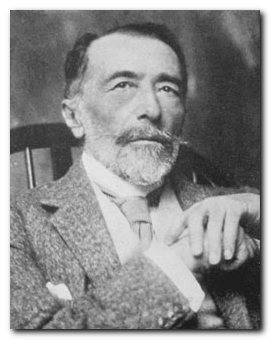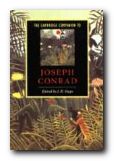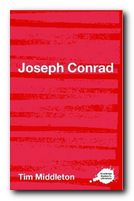timeline of life, career, and literary works
 1857. Joseph Conrad (full original name Jozef Teodor Konrad Korzeniowski) born December 3 in Berdichev (or vicinity) to Apollo Nalecz Korzeniowski and Evelina (Ewa) Bobrowska. Poland at that time is under the control of Russia.
1857. Joseph Conrad (full original name Jozef Teodor Konrad Korzeniowski) born December 3 in Berdichev (or vicinity) to Apollo Nalecz Korzeniowski and Evelina (Ewa) Bobrowska. Poland at that time is under the control of Russia.
1862. Conrad’s father exiled to Russia because of his political liberalism, accompanied by his wife and son.
1865. Conrad’s mother dies. Conrad taken into care of maternal uncle, Tadeusz Bobrowski.
1869. Conrad and his father return to Cracow. Father dies. Conrad sporadically attends school in Cracow.
1873. Leaves for a three-month-long stay in Switzerland and northern Italy. Announces his wish to have a career at sea, which the family resists.
1874. Leaves Cracow for Marseilles to begin life as a sailor on French ships.
1875. Apprentice on the Mont-Blanc, bound for Martinique.
1876-77. From January to July in Marseilles; from July to February 1877 on schooner Saint-Antoine to West Indies.
1877. Acquires (with three other men) the tartane, the Tremolino which carries arms illegally to the supporters of Don Carlos, the Spanish pretender. Conrad probably escaping from gambling debts accrued in Monte Carlo.
 The Cambridge Companion to Joseph Conrad offers a series of essays by leading Conrad scholars aimed at both students and the general reader. There’s a chronology and overview of Conrad’s life, then chapters that explore significant issues in his major writings, and deal in depth with individual works. These are followed by discussions of the special nature of Conrad’s narrative techniques, his complex relationships with late-Victorian imperialism and with literary Modernism, and his influence on other writers and artists. Each essay provides guidance to further reading, and a concluding chapter surveys the body of Conrad criticism.
The Cambridge Companion to Joseph Conrad offers a series of essays by leading Conrad scholars aimed at both students and the general reader. There’s a chronology and overview of Conrad’s life, then chapters that explore significant issues in his major writings, and deal in depth with individual works. These are followed by discussions of the special nature of Conrad’s narrative techniques, his complex relationships with late-Victorian imperialism and with literary Modernism, and his influence on other writers and artists. Each essay provides guidance to further reading, and a concluding chapter surveys the body of Conrad criticism.
1878-79. Mounting financial problems. In February attempts suicide by shooting himself through the chest (which he later passed off as injury in a duel). Uncle Bobrowski pays off his debts and arranges for him to be transferred to England. On April 24 leaves Marseilles on British steamer Mavis. On June 18 sets foot in England at Lowestoft. Serves as ordinary seaman on coaster The Skimmer of the Sea.
1883. Passes mate’s examination on July 4. Meets uncle Bobrowski at Marienbad. Mate on the sailing ship Riversdale.
1884. Second mate on the Narcissus, bound from Bombay to Dunkirk.
1885-86. Second mate on the Tilkhurst; August 19, receives British certificate of naturalization. November 11, passes examination, receives his ‘Certificate of Competency as Master’. His first story, ‘The Black Mate’, submitted to Tit-Bits.
1887. First mate on Highland Forest. Hurt by a falling spar, hospitalized in Singapore (experience recalled in Lord Jim). Second mate on steamship Vidar (Singapore-Borneo).
1888. On Melita (bound for Bangkok), then his first command on the barque the Otago (Bangkok-Sydney-Mauritius-Port Adelaide). Experiences described in The Shadow-Line, Victory, The Secret Sharer. A Smile of Fortune, and other works.
1889. Summer in London; begins writing Almayer’s Folly.
1890. First trip to Poland since he left in 1874. In May he leaves for the Congo. Second in command, then in command of S. S. Roi de Belges.
1891-93. First mate on Torrens. English passenger (Jacques) reads the first nine chapters of Almayer’s Folly, offers encouragement; meets John Galsworthy aboard the ship. Visits uncle Bobrowski in Poland.
1893-94. Second mate on Adowa (London-Rouen-London). Ends his career as seaman on January 14.
1894. Uncle Bobrowski dies on January 29, 1894. In April Conrad sends Almayer’s Folly to T. Fisher Unwin.
1894-95. Writes An Outcast of the Islands.
 The Complete Critical Guide to Joseph Conrad is a good introduction to Conrad criticism. It includes a potted biography, an outline of the stories and novels, and pointers towards the main critical writings – from the early comments by his contemporaries to critics of the present day. Also includes a thorough bibliography which covers biography, criticism in books and articles, plus pointers towards specialist Conrad journals. These guides are very popular. Recommended.
The Complete Critical Guide to Joseph Conrad is a good introduction to Conrad criticism. It includes a potted biography, an outline of the stories and novels, and pointers towards the main critical writings – from the early comments by his contemporaries to critics of the present day. Also includes a thorough bibliography which covers biography, criticism in books and articles, plus pointers towards specialist Conrad journals. These guides are very popular. Recommended.
1896. March 24, marries Jessie George.
1897. Completes The Nigger of the ‘Narcissus’; friendship with R. B. Cunninghame Graham.
1898. Son Alfred Borys born January 14. In October moves to Petit Farm, Kent.
1899. In February completes Heart of Darkness.
1900. Finishes Lord Jim.
1904. Nostromo. Writes the memoir The Mirror of the Sea. Wife falls ill, and becomes practically an invalid.
1905. Spends four months in Europe.
1906. Spends two months in France. Second son John Alexander born August 2.
1907. Children ill in France. Returns to Pent Farm in August. The Secret Agent.
1908. A Set of Six (short stories).
1910. In June moves to Capel House, Kent. Seriously ill.
1911. Under Western Eyes.
1912. ‘Twixt Land and Sea, Tales.
1913-14. Chance. Writes Victory. Leaves for Poland in July 1914; meets Stefan Zeromski in Zakopane; caught by the war in August; escapes and returns to Capel House November 3.
1915. Victory. Within the Tides.
1916. Borys fights on the French front.
1917. The Shadow-Line. Writes prefaces for a new collected edition of his works.
1918. Borys, gassed and wounded, is hospitalized in Le Havre.
1919. The Arrow of Gold. Moves to Oswalds, Bishopbourne, near Canterbury, where he spends the last years of his life.
1920. The Rescue.
1921. Visits Corsica. Notes on Life and Letters.
1923. Visits New York (April-June). Reading from his Victory at home of Mrs. Arthur Curtiss James, May 10. The Secret Agent, Drama in Four Acts (adaptation of the novel). The Rover. Laughing Anne, a play (adaptation of “Because of the Dollars”).
1924. Jacob Epstein does Conrad’s bust. In May Conrad declines knighthood. Health deteriorates and he is bedridden. His wife is also ill. Both sons and Richard Curle are with them. Dies of heart attack 3 August. Buried in Canterbury.
1925. Suspense (incomplete). Tales of Hearsay.
1926. Last Essays.
1928. The Sisters (written in 1896; incomplete.)
1936. Jessie Conrad dies 6 December. Buried near her husband at Canterbury.
© Roy Johnson 2004
Joseph Conrad links
![]() Joseph Conrad at Mantex
Joseph Conrad at Mantex
Biography, tutorials, book reviews, study guides, videos, web links.
![]() Joseph Conrad – his greatest novels and novellas
Joseph Conrad – his greatest novels and novellas
Brief notes introducing his major works in recommended editions.
![]() Joseph Conrad at Project Gutenberg
Joseph Conrad at Project Gutenberg
A major collection of free eTexts in a variety of formats.
![]() Joseph Conrad at Wikipedia
Joseph Conrad at Wikipedia
Biography, major works, literary career, style, politics, and further reading.
![]() Joseph Conrad at the Internet Movie Database
Joseph Conrad at the Internet Movie Database
Adaptations for the cinema and television – in various languages. Full details of directors and actors, production notes, box office, trivia, and quizzes.
![]() Works by Joseph Conrad
Works by Joseph Conrad
Large online database of free HTML texts, digital scans, and eText versions of novels, stories, and occasional writings.
![]() The Joseph Conrad Society (UK)
The Joseph Conrad Society (UK)
Conradian journal, reviews. and scholarly resources.
![]() The Joseph Conrad Society of America
The Joseph Conrad Society of America
American-based – recent publications, journal, awards, conferences.
![]() Hyper-Concordance of Conrad’s works
Hyper-Concordance of Conrad’s works
Locate a word or phrase – in the context of the novel or story.
More on Joseph Conrad
Twentieth century literature
More on Joseph Conrad tales